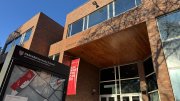The Harvard Kennedy School of Government announced this week contingency plans for educating its international students online or in Canada if they are prevented from returning to Cambridge this fall. And the Harvard T.H. Chan School of Public Health (HSPH), which already offers two master’s programs online, is working to expand its remote learning offerings according to HSPH Dean Andrea Baccarelli, to ensure the continued education of international students.
While the Trump administration’s efforts to revoke the visas of foreign students studying at Harvard have so far been blocked in court, Harvard Kennedy School (HKS) dean Jeremy M. Weinstein wrote in a June 24 email to the school’s international students that he was “announcing these contingency plans now to alleviate the uncertainty many students feel…” The programs will be implemented, he added, only if there is “sufficient demand from students who are unable to come to the United States due to visa or entry restrictions.”
International students made up 56 percent of the HKS student body during the past academic year.
Two options will be offered to HKS students. An online program supplemented by “up to three in-person convenings in cities around the world” and taught by HKS faculty is being developed for new and returning students. Students who have already spent a year studying in Cambridge will have the further option of completing their degree at the University of Toronto’s Munk School of Global Affairs and Public Policy. There, they will be offered courses taught by HKS faculty (online and in-person) as well as instructors from the University of Toronto.
The two options are detailed on a new HKS website for international students that includes frequently asked questions.
“With these contingency plans in place,” Weinstein said in a statement, “HKS will be able to continue to provide a world-class public policy education to all of our students, even if they cannot make it to our campus this year.” Munk School founding dean Janice Stein—noting that “these are exceptional times”—added that the Canadian school “looks forward to providing shared academic and co-curricular experiences for students from both our schools.”
Separately, the Harvard School of Public Health is also developing strategic plans to support its international students, who made up 42 percent of the school’s student body last year. Dean Andrea Baccarelli, in a June 25 interview, noted that the school is working to expand its online offerings so that it can continue to enroll international students in its degree programs.
The public health school currently offers two online master’s degrees, the MPH in epidemiology and the MPH generalist degree, and plans to expand those offerings.
The school, which faces the loss of millions of dollars in federal grants, is also working to create more non-degree programs to enhance the skills of global public health professionals in domains ranging from genomics to health systems operations, Baccarelli said.
Other Harvard schools with large international contingents, such as the graduate school of design, where 56 percent of students hail from abroad, are expected to announce their own contingency plans in the coming weeks.
Although Harvard is reportedly negotiating with federal officials in Washington, Homeland Security Secretary Kristi Noem continued her attempts to sway the court of public opinion with a Washington Post op-ed earlier this week, in which she again accused the University of antisemitism and said the federal judge who blocked her student visa revocation efforts was “biased.” Harvard officials have not responded publicly to that latest salvo; decisions about the fate of Harvard’s international students may well be resolved in federal court.









